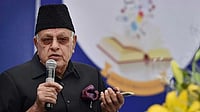Myanmar's de-facto ruler Aung San Suu Kyi's first public address on Rohingya Muslims today had little bearing on rights body Amnesty International which accused the Nobel Peace laureate of telling 'untruths' in her speech.
In what the United Nations called a 'textbook example of ethnic cleansing', the exodus of Rohingya Muslims from Myanmar has had a damaging impact on Suu Kyi's image who preferred to remain quiet till now over the issue that invited global condemnation.
James Gomez, Amnesty International’s Regional Director for Southeast Asia and the Pacific condemned Suu Kyi's address on the issue, accusing both her and the government of 'burying their heads in sand' and resorting to 'untruths' and 'victim blaming' in her speech.
"Aung San Suu Kyi today demonstrated that she and her government are still burying their heads in the sand over the horrors unfolding in Rakhine State. At times, her speech amounted to little more than a mix of untruths and victim blaming," he said.
"Aung San Suu Kyi’s claims that her government 'does not fear international scrutiny' ring hollow. Myanmar has repeatedly said it will not co-operate with the UN-mandated Fact Finding Mission established earlier this year. If Myanmar has nothing to hide, it should allow UN investigators into the country, including Rakhine State. The government must also urgently allow humanitarian actors full and unfettered access to all areas and people in need in the region," he further added.
Earlier today, Myanmar State Councillor Aung San Suu Kyi broke her silence on the Rohingya crisis in the country and said that the government does not fear scrutiny by the international community, even as more than 4,00,000 Rohingya Muslims have fled from the northern Rakhine State.
"There have been allegations and counter-allegations that need to be investigated. The government still needs to find out what the real problems are," Suu Kyi said, in a nationally televised address, the first since an army crackdown on the Rohingya Muslim minority community was branded as "ethnic cleansing" by the United Nations.
Suu Kyi further stressed on the short time her government has been in power for, adding, "I am aware of the fact the world attention is focussed on the situation in the Rakhine State as a responsible member of the community of nations. Myanmar does not fear international scrutiny and is committed to bring peace and sustainable solution that will bring peace, stability and development for all communities within that state."
The United Nations has repeatedly condemned the activities of the Myanmarese government on the Rohingya Muslims, even urging world leaders to impose sanctions on its military.
The call from Human Rights Watch came as the UN General Assembly prepared to convene in New York, with the crisis in Myanmar one of the most pressing topics, on Monday.
Myanmar had earlier suggested it will not take back all who had fled across the border, accusing those refugees of having links to the Rohingya militants whose raids on police posts in August triggered the army backlash.
Suu Kyi however, today said that the majority of the Rohingya villages have not been affected by violence, adding that the military, which was accused of arson and indiscriminate killing, has been instructed to exercise restraint and avoid "collateral damage."
(Inputs from agencies)

























